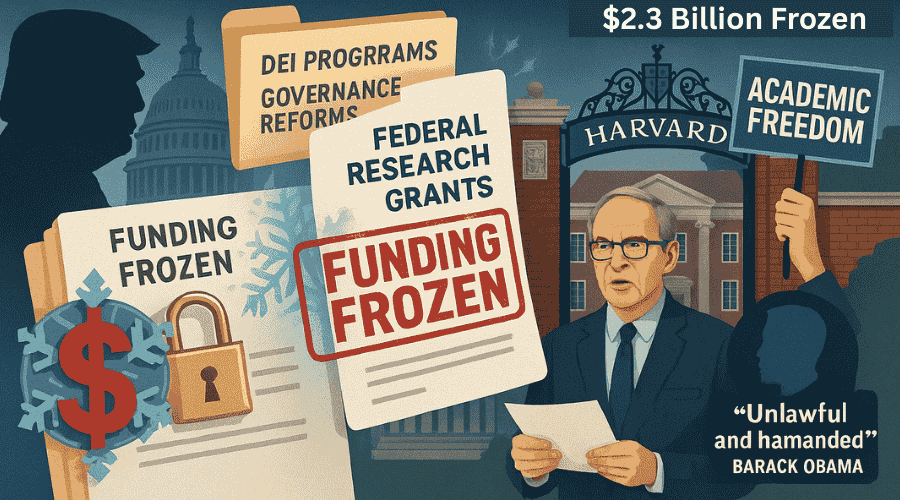Key Points:
- Trump freezes $2.3B in Harvard federal funding
- White House demanded sweeping campus policy reforms
- Harvard refuses to compromise its institutional independence
- Freeze affects major research grants and contracts
- Critics say move endangers academic freedom nationwide
The Trump administration announced on Monday it is freezing roughly $2.3 billion in federal funding to Harvard University, marking a major escalation in the White House’s crackdown on elite academic institutions that resist federal influence.
The move came just hours after Harvard publicly rejected a list of demands from the Trump administration, which included ending diversity, equity, and inclusion (DEI) programs, tightening oversight of foreign students, and modifying its governance and admissions policies.
The administration also urged the university to suppress certain forms of campus activism, particularly those seen as linked to recent pro-Palestinian demonstrations.
Harvard President Alan Garber issued a strong response in an open letter to the university community, stating, “The university will not surrender its independence or relinquish its constitutional rights. No administration — regardless of its political orientation — should dictate what private institutions can teach or whom they admit.”
The federal freeze includes around $2.2 billion in research grants and $60 million in federal contracts, according to the Department of Education’s Joint Task Force to Combat Antisemitism. The task force claimed Harvard’s stance reflects “a troubling entitlement mindset” and fails to uphold civil rights expectations tied to federal investment.
The administration justified the move as part of a broader investigation into alleged antisemitism on college campuses, but Harvard officials contend the government’s demands far exceed that scope.
Garber emphasized that the majority of the administration’s requests had little to do with combating antisemitism and more to do with regulating academic autonomy and campus culture.
Harvard’s defiance makes it the latest and most high-profile university to clash with the Trump administration over federal oversight. Other prestigious institutions, including Columbia, Princeton, and the University of Pennsylvania, have also faced funding threats for resisting similar demands.
Columbia reportedly complied under pressure, while others remain under review. The backlash was swift. Former President Barack Obama condemned the decision, calling it “unlawful and ham-handed” and urging other universities to stand firm against federal intrusion. “Academic freedom must be defended, especially in times of political pressure,” he said.
Critics warn that the funding cut could have a ripple effect, jeopardizing critical research and academic programs not just at Harvard but across the broader higher education landscape. Garber noted that stripping funding from a leading research institution “risks not only scientific progress but the health, well-being, and economic stability of the nation.”
As legal and political battles loom, Harvard has made it clear: its commitment to academic independence will not be compromised — even at the cost of billions.
Related blog post: Boise State Forced to End Key Program After Federal Education Funding Slashed

